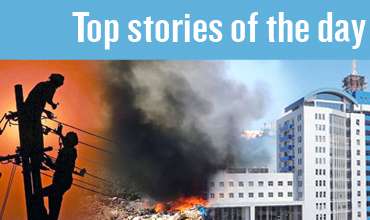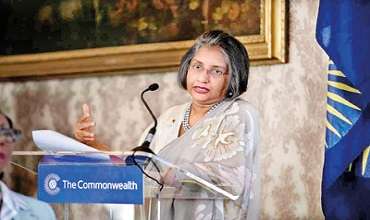CEDAW urges Govt to expedite Muslim personal law reforms
GENEVA ( March 6, 2017) – The UN Committee on the Elimination of Discrimination against Women (CEDAW) has called on Sri Lankan Government to expedite reforms of personal laws -- the Kandyan Law and Thesawalami and the Muslim personal law – and ensure women’s participation in the constitution-making process.
Noting that the Sri Lankan government has taken a series of positive measures in empowering women, the CEDAW it its country report says the Committee welcomes the progress in undertaking legislative reforms, in particular the adoption of the 19th Amendment to the Constitution, the Assistance to and Protection of Victims of Crime and Witness Act, the amendment of the Local Government Elections Act, giving 25% quota for women in Local Government bodies and the finalization of the National Human Action Plan, among others.
The CEDAW has published its findings on Sri Lanka, Ukraine, Ireland, Jordan, El Salvador, Germany, Rwanda and Micronesia after its review of the situation in these countries during its 13 February to 3 March 2017 session in Geneva.
The findings cover how the respective State is doing with regard to women’s rights, detailing positive developments, main areas of concern, and recommendations for action.
On the Muslims Personal Law issue, the Committee acknowledges that a Cabinet Sub-Committee was appointed in 2016 to amend the Muslim Marriage and Divorce Act. However, it notes that the Committee appointed by the Minister of Justice in 2009 to consider and propose reforms to Muslim Personal law and the Quazi courts has not issued any recommendations. The Committee reiterates its previous concerns (CEDAW/C/LKA/CO/7, para. 44) and, given that the Muslim Marriage and Divorce Act imposes exclusive and compulsory jurisdiction over Muslim marriages, the Committee expresses its particular concern that:
(a) It does not specify a minimum age of marriage and girls under 12 years of age are permitted to marry;
(b) It restricts the legal and judicial officer positions of Quazis, Board of Quazi members, Marriage Registrars and adjudicators to male Muslims only; and,
(c) The law on statutory rape is not applicable to girls under 16 years of age who are legally married under Muslim law, who engage in sexual intercourse with their husband while not legally separated.
The report also urges the Government to:
Prepare a unified family code in conformity with the Convention in which equal rights of women and men in the family relations, including marriage, divorce, inheritance, property and land are addressed;
(b) Amend the General Marriage Registration Ordinance to ensure that Muslim women have the free choice to opt out from the Muslim Personal Law, so as to be registered under the general law;
(c) Ensure that property rights are governed by general civil contractual and property law rather than religious law;
(d) Increase the minimum age of marriage for all women in the State party to 18 years of age;
(e) Eliminate any restriction on women’s eligibility to be appointed as Quazis, as Members of the Board of Quazis, Marriage Registrars and adjudicators; and,
(f) Amend article 363 of the Penal Code to ensure that the crime of statutory rape applies to all girls under the age of 16, without exception.
Outlining its recommendations, the CEDAW urges the Sri Lankan government to amend all Personal Laws, including the Muslim, Kandyan and Tesawalamai Personal Laws, to remove discriminatory provisions regulating ownership, inheritance, transfer and disposal of land and property, as well as provisions regulating legal capacity, marriage, divorce, and child custody.
On transitional justice with regard to issues stemming from the end of the war, the Committee commends the development of programmes for transitional justice, resettlement and constitutional reform, including the appointment in 2016 of a Consultation Task Force on the design and implementation process of the mechanisms for truth seeking, justice, reparations and non-recurrence, in line with resolution 30/1 of the Human Rights Council. The Committee notes the finalization of the Task Force report in January 2017.
However, it notes with concern:
(a) The underrepresentation of women in peacebuilding, reconstruction and reconciliation process, and the absence of a finalized national action plan for the implementation of Security Council resolution 1325 (2000) and subsequent resolutions on women and peace and security to guide post-conflict processes in the State party;
(b) Slow progress in setting up structures that would allow for the design and establishment of the different transitional justice components, including a comprehensive transitional justice strategy; and,
(c) The delay in attaining Presidential signature of the Office on Missing Persons Act, No. 14 of 2016, and reports that the Act may be revised to eliminate paragraph 11(a) which provides for international cooperation.
For the full report: Please visit
Concluding observations on the eighth periodic report of Sri Lanka
-
Still No Comments Posted.













Leave Comments